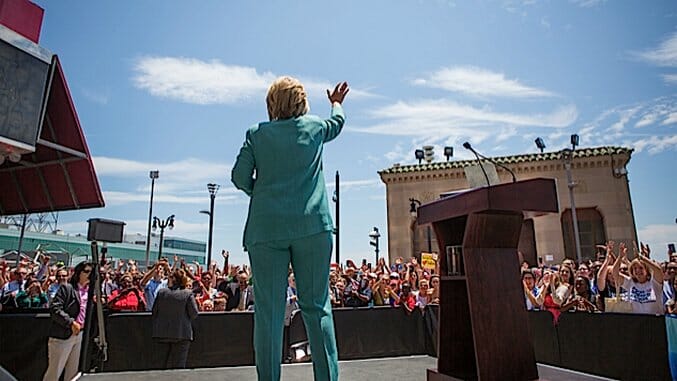The Last Question On Clinton’s Emails: How Much Will the Democratic Party Risk to Elect Her?
Photo by Jessica Kourkounis/Getty
The FBI’s recent announcement that it would recommend ‘no charges’ for Hillary Clinton over the use of her private email server sparked a firestorm. The reason for the uproar has to do with how we got to this point. The investigation has been ongoing for months, and during that time, Clinton’s story has been slowly discredited. Even in this apparently exonerating announcement, FBI Director James Comey, revealed that the narrative her campaign had been touting for over a year—that no classified emails were transmitted over the server except some that were classified retroactively—was false. He also characterized her behavior as “extremely careless.” Previously the State Department had released its own findings that the former Secretary had violated federal rules by deleting emails.
As if that weren’t bad enough, adding fuel to the fire, top Clinton aides have repeatedly plead the Fifth, and Huma Abedin revealed that the former Secretary would burn some of her schedules. Her aides had to plead the Fifth multiple times during their interrogations by the Bureau. But perhaps the most controversial aspect of what can only be described as a damning exoneration is the appearance of insider politics.
Not only has President Barack Obama been campaigning for Clinton after an unprecedented endorsement by a President of the United States for a successor, but her husband, former President Bill Clinton met with Attorney General Loretta Lynch in private, for an ‘unrelated’ talk about children on the tarmac at Phoenix’s Sky Harbor International Airport. Further muddying the waters, as Maureen Dowd of The New York Times reported, there’s been talk that “Hillary might let Lynch stay on in a new Clinton administration.” The obvious conflicts of interest now threaten to undermine public trust in the process and our system. At this point, there is no chance this scandal will disappear.
Hillary Clinton is not even officially the nominee and controversy surrounds her. As the Democrats head towards what could be a contested convention because neither candidate has enough pledged delegates to win without the support of the superdelegates, there is much to consider.
The Democratic Party has already sacrificed the trust of the progressive left in order to push a Clinton nomination. From the debate schedule and the revelations from the Guccifer 2.0 leak to the ‘Bernie Bro’ narrative, there is now a deep rift between Democrats. Any chance at reunifying has been lost now that the establishment wing turned against the Occupy wing—and that’s all thanks to Clinton and her allies.
The question raised by the new revelations about Clinton’s emails is just how big a risk are Democrats willing to take when the American people are so desperate that Donald Trump became a major party (presumptive) nominee for President of the United States?
Hillary Clinton is a polarizing figure. Both progressive left as well as the conservative right are against her—though for opposite reasons. In fact, most Americans associate her name with the words ‘dishonest’ and ‘liar.’ They trust Trump more than her on the economy. In spite of the fact that her campaign is, as Robert Reich pointed out, running like “clockwork,” blanketing swing states with ads while Trump’s campaign falters, Clinton is losing ground or stagnating dangerously within the range of the margin of error. As I pointed out in a previous piece, her RealClearPolitics polling average against Trump puts her “an uncomfortable six points ahead;
It does seem that the more people know about Hillary Clinton, the less they like her. The recent announcement about her emails, though perhaps a source of relief for Clinton personally, will likely reinforce the mistrust.
-

-

-

-

-

-

-

-

-

-

-

-

-

-

-

-

-

-

-

-

-

-

-

-

-

-

-

-

-

-

-

-

-

-

-

-

-

-

-

-








































